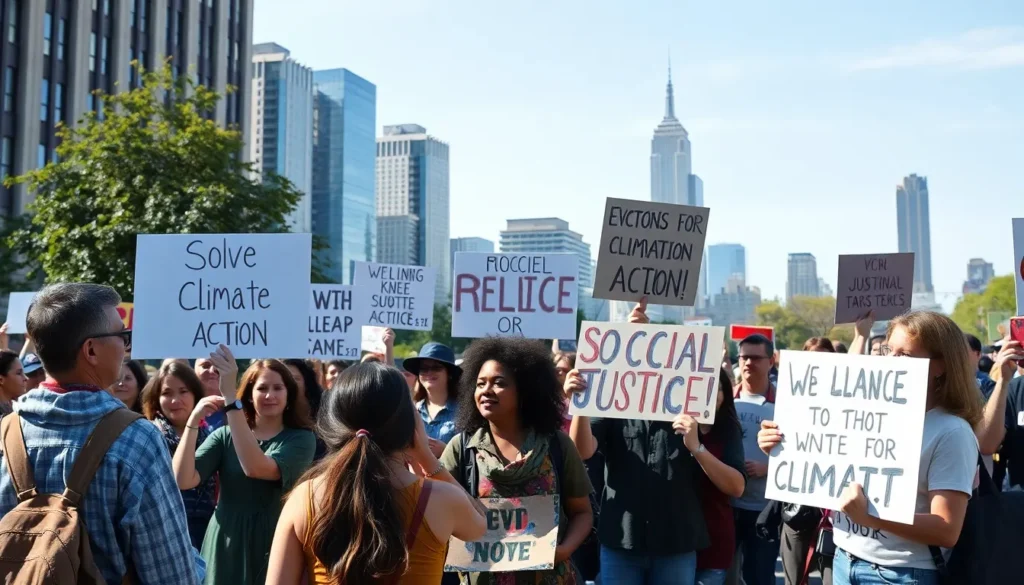Table of Contents
ToggleIn an increasingly interconnected world, understanding global events is more crucial than ever. Each day, news from around the globe shapes economies, cultures, and political landscapes. Analyzing these events helps individuals and organizations navigate the complexities of international relations and societal shifts.
From political upheavals to climate crises, the ripple effects of world events can be profound. Insightful analysis can uncover underlying trends and implications, providing a clearer picture of what lies ahead. As the world continues to evolve, staying informed and engaged is essential for making sense of the challenges and opportunities that emerge.
Overview of World Events Analysis
World events analysis examines international occurrences to identify trends and implications. This analysis encompasses political changes, economic shifts, and social movements. By dissecting various events, analysts uncover insights into the underlying factors shaping global dynamics.
Analysts monitor multiple sources, including news outlets, government reports, and social media platforms. They assess data for accuracy and reliability, contributing to well-rounded conclusions. For instance, analyzing economic sanctions provides insights into their impacts on nations’ economies and international relations.
Understanding the chronological progression of events aids in predicting future developments. Analysts employ historical context, recognizing patterns that may recur under similar circumstances. This context enriches decision-making for governments, businesses, and individuals.
The role of technology in world events analysis has grown markedly. Data analytics tools process vast amounts of information and reveal correlations not easily visible through traditional methods. Machine learning algorithms enhance predictive accuracy by identifying trends based on historical data.
World events analysis serves as a critical tool for individuals and organizations. It allows for informed decisions amidst complex global challenges. Staying engaged with ongoing analyses supports better understanding and awareness of the world stage.
Key Factors Influencing Global Events

Various factors play crucial roles in shaping global events. These include political climates, economic trends, and social movements, each significantly impacting international relations and societal developments.
Political Climate
Political climate influences global stability and relations. For instance, changes in leadership can lead to different foreign policies that affect alliances and conflicts. Events like elections, coups, and legislative reform shape a nation’s interaction on the world stage. Analysts monitor this climate through indicators such as public sentiment and government stability, assessing how these elements can affect international collaboration or tensions. High-stakes situations, such as geopolitical conflicts, often stem from shifts in political priorities, impacting regional security and economic partnerships.
Economic Trends
Economic trends reflect shifts in global markets and financial policies. Indices like GDP growth, unemployment rates, and inflation rates provide insight into economic health. Events such as trade agreements or sanctions can directly influence market dynamics. For example, fluctuations in commodity prices impact nations dependent on resources. Globalization has interconnected economies, meaning that a downturn in one region can trigger effects worldwide. Analysts use economic models and data reports to assess risk and identify opportunities, contributing to more informed policy decisions.
Social Movements
Social movements serve as catalysts for change within societies. Movements advocating for civil rights, climate action, or social justice shape public discourse and often lead to policy changes. They reflect the values and priorities of communities, influencing governments and institutions. Significant events, like protests or rallies, highlight these issues on the global stage, prompting international responses. Analysts track these movements to gauge social cohesion and predict potential shifts in cultural norms and legislation, offering insights into emerging trends and public expectations.
Major Recent World Events
Recent global events demonstrate complex interactions among political, economic, and social factors. Analysts continuously assess these occurrences to provide valuable insights.
Event One: Impact and Analysis
The ongoing conflict in Ukraine has far-reaching implications for international relations and economic stability. The invasion by Russia prompted widespread global condemnation and extensive sanctions from Western nations. Analysts note that these sanctions have significantly affected Russia’s economy, leading to inflation rates exceeding 20% in the first half of 2023. Additionally, energy markets faced disruptions, with European countries shifting to alternative gas sources, resulting in increased competition and cost fluctuations. These dynamics emphasize the importance of geopolitical stability, as they influence allied nations’ foreign policies and global economic health.
Event Two: Impact and Analysis
The COVID-19 pandemic’s aftermath continues to shape social movements worldwide. A recent surge in protests regarding healthcare access and policy responses emerged in multiple regions. Analysts find that public discontent often correlates with increased government scrutiny and intervention. For example, the United States witnessed a rise in advocacy for universal healthcare, reflecting growing public demand for systemic change. Furthermore, the pandemic highlighted disparities in healthcare access, leading to a broader examination of social equity issues. These movements signify a shift in public priorities, compelling policymakers to respond and adapt to emerging societal expectations.
Methodologies for World Events Analysis
World events analysis employs a variety of methodologies to assess and interpret global occurrences effectively. Analysts commonly utilize the following methods:
- Qualitative Analysis
Qualitative analysis focuses on understanding the underlying factors and contexts of events. Analysts review interviews, expert opinions, and thematic articles to discern motivations behind political changes or social movements. This approach helps in grasping the sentiments and narratives driving public opinion.
- Quantitative Analysis
Quantitative analysis emphasizes numerical data and statistics. Analysts gather data from reliable sources, including government reports and economic indicators. Techniques such as regression analysis and statistical modeling allow them to establish relationships and predict future trends based on historical data.
- Comparative Analysis
Comparative analysis involves examining similar events across different countries or regions. By comparing political responses to economic crises or social movements, analysts uncover patterns and differences that illuminate unique contextual factors influencing outcomes.
- Trend Analysis
Trend analysis helps analysts identify patterns over time by examining historical data. They assess various factors, such as demographic changes, economic indicators, and political shifts. This methodology enables predictions about future developments and potential impacts on global dynamics.
- Scenario Planning
Scenario planning involves creating hypothetical situations to explore possible future developments. Analysts formulate multiple scenarios based on varying assumptions and analyze how different variables may interact. This approach aids organizations in preparing for uncertainties and developing strategic responses.
- Technological Tools
Technological tools, including data analytics software and machine learning algorithms, enhance the analysis process. These tools analyze large datasets quickly and efficiently, revealing correlations and trends that may not be apparent through traditional methods.
- Engagement with Stakeholders
Engagement with stakeholders, including policymakers, academics, and community leaders, enriches analysis. By gathering insights from various perspectives, analysts develop a more nuanced understanding of events and their implications.
By implementing these methodologies, analysts deliver comprehensive insights into world events, aiding decision-making and fostering a deeper understanding of global interconnectivity.
Staying informed about world events is essential for navigating today’s complex global landscape. The interplay of political, economic, and social factors shapes international relations and influences local communities. By employing various analytical methodologies and leveraging technology, analysts provide critical insights that empower individuals and organizations to make informed decisions.
As global dynamics continue to evolve, understanding the implications of these events becomes increasingly vital. Engaging with the analysis of world events fosters a deeper awareness of emerging challenges and opportunities. This knowledge not only enhances personal understanding but also contributes to collective efforts in addressing the pressing issues facing humanity today.



